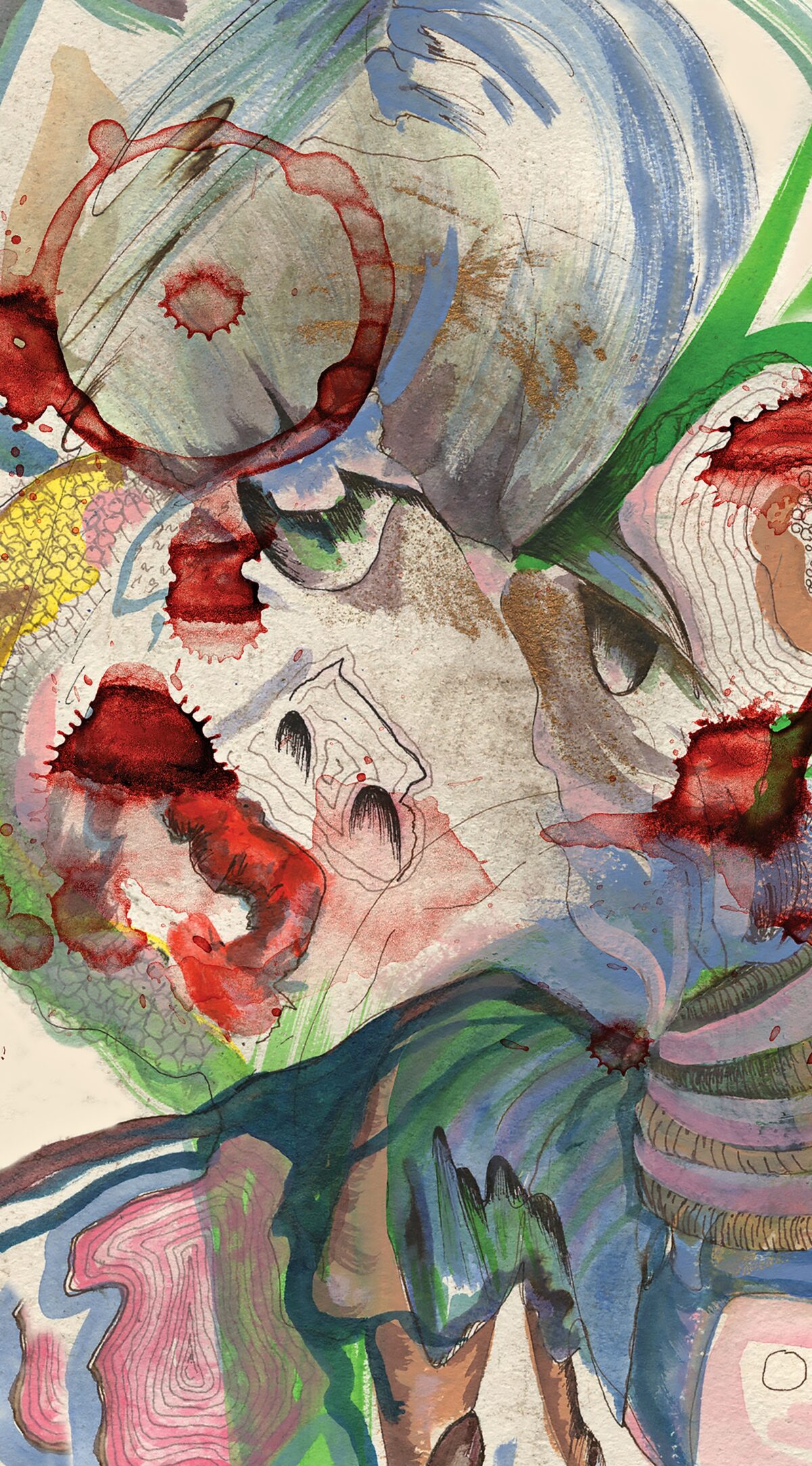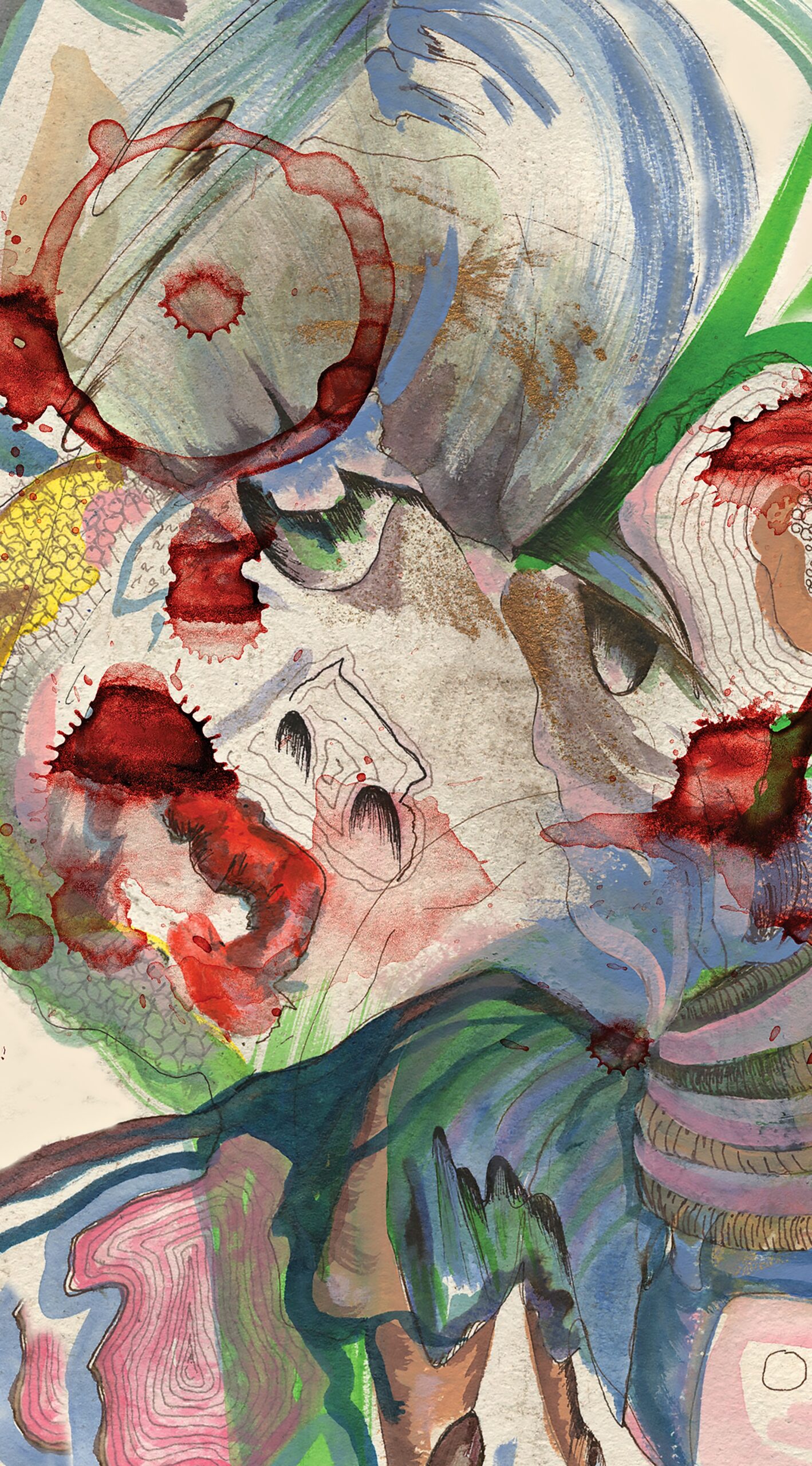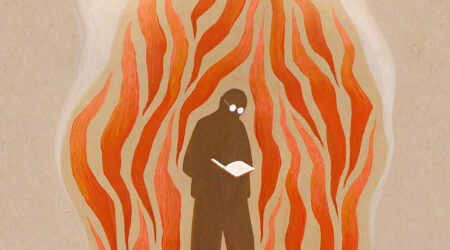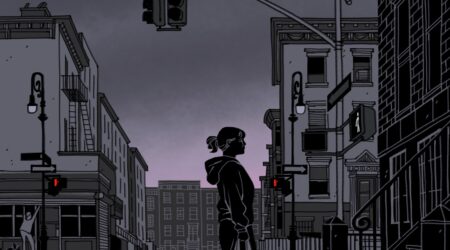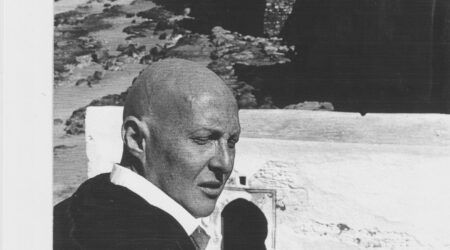My brother’s eye was swollen shut. When he finally woke, opening the good one, he said sorry and thank you to everyone who checked his status. A nurse told me that after the ambulance had dropped him off, he wouldn’t stop yelling obscenities and taking swings at anyone who came near. Now the nursing staff shook their heads in disbelief, as if wondering how the kind man tucked in hospital bedding could’ve been so violent the night before.
Dom found me standing at the foot of the bed and said, “Jenny, am I dead?”
It all felt like something staged. His face resembled bad prosthetic makeup, and I imagined if I pulled back the curtain dividing the room, I’d find a patient in full body cast slurping through a straw.
“Not yet,” I said.
“You call Mom?” he said.
“Sun’s still down out west.”
“Don’t. She doesn’t need to know. Make sure Dad doesn’t call her either.”
“He hasn’t spoken to her in months.”
“Have you?” he said. “Mom?”
“Not often, but when I do, she asks about you.”
“What do you tell her?”
“What I always tell her. That you’re doing well. Happy.”
Dom approved of the lie, even though I knew Mom never bought it anyway.
“She’s mentioned us flying out,” I said. “To visit.”
When I was younger and more upset about missing Dom than understanding why he needed to go, he told me that running is in our blood. One day, he said, you’ll come to understand.
He closed his good eye. Maybe he was thinking of where he’d driven off to in his truck. I wanted to pretend I was angry that I hadn’t seen him in six months or that he hadn’t texted or called, not even on my twenty-first birthday. But Dom’s disappearances never followed an argument or fight. I thought of them as weary impulses. Like when Mom used to get home late from work, sink into the couch and say, “What about Chinese again?” Then she’d crack open a lager and be on her third before the delivery boy arrived. When I was younger and more upset about missing Dom than understanding why he needed to go, he told me that running is in our blood. One day, he said, you’ll come to understand. He was right. Our father left for the east coast before I learned how to walk. Dom left Mom and me right after getting his GED. I followed suit a few years later.
“Where were you last night?” I asked.
He shook his head. “Come here.”
I inched closer. His eyeball was buried. Teardrops formed at each corner. He’d aged since I’d seen him last. Just a smidge grayer and our four-year difference seemed double. Coarse hair grew from his nose and ears. And the baseball-sized lump taut between skin and skull suggested an old trauma within had finally managed its way to the surface.
“I feel something, like, scratching,” he said. “I think my contact lens is in there.”
“No one told you what happened?”
“Just take a look, Jen.”
Where the skin was tightest, I could see no pores. He was still wearing a t-shirt, his collar a stained ring of sweat. Then, with musician-like precision, he placed two fingers on his eyebrow, and with his other hand, two fingers below the eye.
“I feel like it’s trying to move up and behind the eye or something.”
He pulled away the engorged lids and revealed a red eyeball spinning around like a faulty compass trying to find its way. He poked at the white parts, searching for the errant contact. His mouth was agape, and he squirmed and shifted his tightly covered feet.
“You see it?”
“I don’t see anything,” I said. “It just looks really red.”
“You don’t see it near the top? I feel it there. I feel it scratching.”
His dabs became hectic pokes.
“Move your fingers,” I said.
He looked down, trying to reveal something, but his eye zipped shut and he clenched hard as tears rolled down the top of his nose.
A woman old enough to be our mother came into the room carrying a clipboard and wearing street clothes instead of the usual pastel-colored scrubs. She projected an air of restlessness, as if visiting her very own son.
“Dominic. How are you feeling?”
“There’s something in my eye.”
“I’m sure they’ll take a look for you.” She smiled at us, then reviewed her paperwork.
Dom asked if he could keep his eyes closed.
“Of course,” she said. “Are you siblings?”
“According to our parents,” I said.
She smiled again and scribbled into the clipboard. “It’s nice when family shows up for each other.”
Dom nodded.
“Do you remember the last time you were intoxicated prior to last night?” she said.
“Not to this degree.”
“Do you remember the last time you were intoxicated at all?”
“Maybe.”
“And did you plan on drinking last night?”
“I did.”
“Did you plan on driving home?”
“I had no plan.”
“We recorded your blood alcohol level at .27%—”
Then a spiel began, an expertly rehearsed speech saved for all the drunks who inevitably ended up here. And I zoned out. Not because it was insincere or used words like help and support, but I knew Dom couldn’t have a drinking problem. My brother was too lazy to be an alcoholic. Our mother had taught us something that many people don’t realize—it takes work to become a drunk. It’s no easy endeavor.
The woman finally lifted her pen and stuck the clipboard beneath her armpit.
“I appreciate your cooperation, Dominic,” she said. “I do have one last question.”
Dom opened his good eye.
“Do you abuse alcohol?”
His face emoted a twisted something, but it was hard to read through the swelling. The machines beeped beside him and someone next door let out a painful groan. My brother turned to me as if searching for an answer. Then the lady looked my way, too. I shrugged.
Dom suddenly shrunk under the tight and restrictive blankets. Only his arms and head poked out. When he finally answered, he sounded like a boy.
“I guess so.”
In the hallway, I called Dad. He still had no clue why I hurried out earlier that morning with my phone pressed to my ear. I wanted to tell him that Dom was finally back and end the call there, no bloody details, but this was Dom’s longest disappearing act, and if Dad and I ever bonded over anything, it was missing Dom.
“Do you want the good news or bad?”
“Spit it out, Jen,” he said. “Give it to me straight.”
I told him what the lady with the clipboard had told me: Dom went to the Lamplighter last night. She didn’t know why they asked him to leave, but a bouncer escorted him out, and that’s when things went bad. I could imagine how it spun out from there: outside, near the smokers and people standing around eating dollar slices from Luigi’s next door, Dom took a feeble swing at the nighttime air. The bouncer, who must’ve been an amateur boxer in his spare time, punched Dom square in the face, knocking him straight into the gutter.
This was a man who’d walk out of a movie theater crying—his face the shape of a tragedy mask—then snap at the pubescent usher for having the volume too low or the ceiling fans spinning too fast.
Dad huffed and puffed as I explained. I could almost hear the pulses firing off in his brain. This was a man who’d walk out of a movie theater crying—his face the shape of a tragedy mask—then snap at the pubescent usher for having the volume too low or the ceiling fans spinning too fast. He was someone who’d get out of his living room chair and stand toe to toe with the television, like they could hear him in there: “Fuck you, Gruden! You wish you were John Madden. You wish it!” Now everything came pouring out like an all-out blitz: “It’s unbelievable that this happened. Un-be-lievable. There goes my weekend. Don’t tell your mother about this—she’ll have a fit! I mean, that guy should lose his job. You can’t do that to someone. You can’t do that to someone and get away with it. You know, Jenny, we live in a funny world. A very funny world. A world full of hotheads. Don’t cross them, you can’t cross them. They’re all junkyard dogs waiting for an excuse. Watching and waiting. I mean, we should do something. We could do something. We could go down there. What do you say? Let’s go down to that crummy bar. Let’s go down there so I can give them a piece of my mind.”
“I’m not going down there, Dad.”
“I’m just sick of it. All my life I’ve taken crap from people.”
“Maybe he had a few too many, you know?”
“I hear you, Jenny. Dom’s no saint, but—wait a minute, you said there was good news.”
A doctor walked past me in the hallway, so I hung up the phone and followed her into the room.
“. . . a complex fracture. Your zygomatic bone, or cheekbone, will need reconstruction. Surgery. Without it, there may be slight but lasting disfigurement. Only after the swelling goes down can we assess the damage to your sinuses and vision. Unfortunately, this sort of trauma tends to have lingering effects.”
“There’s something in his eye,” I said.
“Your cornea is scratched, Dominic. Nurses cleaned out your eyes last night.”
The doctor left the room.
Dom said, “Find my pants.”
His jeans were hanging on the bathroom door, stained with a mixture of blood and vomit. When I returned to the bed, he was standing in his underwear. Half of his leg was bruised black from what I assumed was a nasty fall.
Dom grabbed the sunglasses hanging from the collar of my shirt.
“Everything’s too bright out here,” he said.
As we limped down the hallway, not a soul passed. Only a lone man called from inside a dim room, where I saw his leg elevated by a contraption on the ceiling. Rods and screws stuck out of the engorged limb, and his purple toes made the building throb.
“Hello?” he said softly. “Hello? Can you help me? I’m in pain. Great pain.”
Dom fit into his old bed more comfortably than the hospital’s. He kept the sunglasses on and mumbled about the cracks in the blinds being too bright. I hung a sheet over the window to block out the sun, then put a glass of water and garbage pail nearby, just in case.
“Yeah, good idea,” Dad said. “Put that glass there. Put that pail right there. Good, good. Let’s leave him alone now.”
Dad and I sat at the small, round table in the kitchen, eating cereal and listening to Dom snore—a sound I couldn’t stand when we shared a room as kids.
“Doctor says he needs surgery,” I said.
“For what?”
“They say he’ll be permanently disfigured otherwise.”
“No way.”
“They say his skull is broken.”
“I don’t believe it.”
“But that’s what they say.”
Dad dismissed the idea with a wave of his spoon and then finished his bowl of Corn Flakes. We sat there quietly in a daze. Enough time passed where we both poured another bowl.
“Your brother has been through a lot,” he whispered. “He never wanted to live with your mother after the divorce.”
“Yes, he did. We both did.”
“This was before your time. Trust me. How could you know? You were too young.”
Mom never put up a fight when Dom wanted to move across the country and live with Dad. She didn’t give me guff either when I followed Dom’s trail a few years later, though I always felt guilty leaving the only other woman behind. Early on, living with Mom was ideal, warm, and stable. That was our home until her drinking pushed Dom and me toward the person whose abandonment caused her to pick up the bottle in the first place.
“We need to get his truck,” Dad said.
“Just his truck,” I said.
“Right. Just the truck. Now, go find his keys.”
I always knew when he lied, a skill I inherited from Mom.
“You think it’s all right to leave him alone here?” I said.
“He’s not going anywhere yet.”
“What if he needs something?”
“Like what?”
“I don’t know. What about the liquor cabinet?”
“This is no time for a drink, Jen.”
“No shit. I’m wondering if we should clear it out.”
“Oh, sweetheart. You know your brother’s nothing but a beer man.”
In Dom’s dark bedroom, I found his dirty jeans scrunched up on the floor. His snoring had relaxed to a soft hum, a borderline whimper. I quietly searched the pockets for his keys. Receipts for dollar menu cheeseburgers spilled out of his back pocket, and his wallet fell to the floor.
“Mom?” he said.
“Where are your keys?” I said.
“Where am I?”
“You’re at home.”
“Where’s Mom?”
“We’re at Dad’s.”
“Don’t tell Mom about this, Jenny. She’ll spiral.”
“The keys, Dom.”
He raised an arm from beneath the covers and pointed out the covered window. “Under the seat.”
He began snoring softly again before I gently closed the door.
Dad drove ten miles below the speed limit, being careful not to roll through stop signs or yellow lights. He wouldn’t even take his eyes off the road when I lowered his favorite jazz station. I tested him by suggesting he step on it, but he wouldn’t. “Left here,” I told him, but he kept going his own way. “Where are we going?”
He reminded me of someone pumping himself up before a fight or match of some sort—the huffing, the puffing, the bobbing head.
Your mother never really knew why I quit my job at Western Telecom. You have to understand, everyone was doing coke back then. Everyone was doing it, but I never did.
“Your mother never really knew why I quit my job at Western Telecom. You have to understand, everyone was doing coke back then. Everyone was doing it, but I never did. Mike Hardiman was one of those hotheads to begin with. Dumber than shit. That concrete out there has more brains. And I walked in that day just minding my own business. Something always happens to someone who’s minding his own business. The thing is, no one had told me someone had fucked with his car that morning.”
I knew the story already. He knew that I knew the story already. But there we were, in the middle of it.
“You really had no idea that someone messed with his car?” I said.
“Why don’t you believe your dad?”
“Why don’t you answer the question?”
“I didn’t have a clue,” he went on. “They told me after it’s why he was so steaming hot.”
“What did you say to him? How did you say it exactly?”
“That’s where I’m going. I walked into the office that morning, and you know what? It may have been the only time in my life I was whistling to myself as I walked into work. Did I ever tell you that part?”
The whistling was new.
“I mean, whistling. Who whistles? Do you know how many jobs I’ve had? Whistling at work. And Mike Hardiman comes steaming down the hallway. Piping hot, the fucking hothead that he is. High as a kite, too. And yeah, maybe I noticed he was a little off-kilter, and maybe there was a tiny little sliver of something inside of me saying that I shouldn’t bug him, but I was just minding my own business. And sure as hell, I can never get away with anything. Anything. So I say—”
“But how did you say it?”
“Just as I say it now! I say, ‘Morning, Mike! How goes it?’ And without a word, he pops me right in the chin.”
“And you didn’t fall down.”
“Is that really so hard to believe?”
“Why didn’t you hit him back?”
He fidgeted in the seat, shook his head, looked in the side mirror. “It was just one of those unexpected things. I couldn’t believe it.”
“Did it hurt?”
“What do you think? And everyone told me to sit down, and Oh, oh, oh, dear, are you OK, Tony? You know what they do. They were scared I’d make a big stink about it, so they told me to go home. I wanted to work, but they wouldn’t let me. So here’s the lesson, and I know you don’t want to hear my lessons anymore, but here it is: if someone gives you crap, you don’t let anyone tell you how to handle the crap you’ve been given. I should’ve popped that bastard Hardiman right back, just like I should’ve with Johnny Simone—that Nelson Muntz. When Johnny Simone pantsed me in the fourth grade, I should’ve pulled up my shorts, stepped over to the bookshelf, grabbed The Complete Illustrated Encyclopedia of Dinosaurs and Friends—because that was the thickest one—and slammed it into the side of his head. That would’ve been it.” He took his hands off the steering wheel and wiped them clean. “That would’ve changed everything.”
When Johnny Simone pantsed me in the fourth grade, I should’ve pulled up my shorts, stepped over to the bookshelf, grabbed The Complete Illustrated Encyclopedia of Dinosaurs and Friends—because that was the thickest one—and slammed it into the side of his head.
It wasn’t always a pantsing. Sometimes it was a wedgie, a noogie, or a punch in the gut. I’d usually remind him of this, and he’d tell me I had missed the point. But the details were important. The history needed to be firm. We could never agree on what exactly happened between him and Mom. He’d say it one way, then he’d say it another way, then Dom would correct him, and I’d correct Dom, then we’d call Mom, and she’d say we had it all wrong, that it was the way she remembered it, and most of the time, I believed her. It was always easiest to believe her.
With that Mike Hardiman and that Johnny Simone, I didn’t correct him.
“I never told your mother,” he said. “It was all chin. No bruise.”
A few weeks later, after Dad couldn’t stomach the embarrassment of the office, he quit. He told Mom some nonsense about being passed up for a promotion.
“Wait here,” he said.
We parked outside of a True Value hardware store, a couple blocks from the Lamplighter. Dad went inside, and I knew his plan would continue with some kind of paint-bomb revenge plot. The Lamplighter would suffer something like Mike Hardiman’s vandalized car, and despite not knowing for sure, I wouldn’t be surprised if the culprits were the same. I could foresee Dad hurling paint balloons at the front door, leaving big red splats where Dom had been knocked unconscious the night before. A part of me wanted to join, but Dad’s high jinks had nothing to do with my brother and everything to do with himself.
I got out of the car and started down the street looking for Dom’s blue pickup. I walked down the main road past the Mission Thrift, with all its pieces of furniture strewn out on the sidewalk; past the new laundromat redesigned to look less like a deli and more like an airport hangar; past Luigi’s, where pizza grease stained the sidewalk; past the Lamplighter, the kind of bar that opens at 6 a.m.; and finally found myself at the passenger’s side of Dom’s truck. It was exactly as I remembered—a reliable piece of shit covered in mud and overflowing with the trash of a thousand fast food dinners.
Dom was sitting on the porch step when I pulled into the driveway. He hugged me with one arm when I sat down. The sunglasses did little to hide his appreciation, but he was never one for saying thanks outright.
“You finally got your wish,” he said. “Rides better than it looks, doesn’t it?”
It did. He’d never let me drive it before. “Keys were in the sun visor.”
He shrugged. “Where’s Dad?”
“Getting into trouble, I’m guessing. How’s the eye?”
“Jelly.”
“You gonna get the surgery?”
“That doctor doesn’t know what she’s talking about. It’s just a shiner.”
In the good light of the outdoors, the bluish-black lump stretched beyond the protection of the sunglasses. “You’re seriously busted up, Dom.”
He waved it off, and I caught a glimpse of Dad in the gesture.
“I’m not sure I can keep this up,” he said.
“Maybe it’s time to stop running then.”
“We’re getting too old to be living at home, don’t you think?”
“It’s not like cleaning houses offers me many options.”
“I remember thinking all my friends had it tough growing up with their parents breathing down their necks, telling them what to do all the time, where to be and for what. But we could’ve used someone to hold us accountable. That’s what I’m coming to realize. It’s on us now, Jenny. You’ve got to figure out how to do things when no one’s around to tell you what to do.”
He stood up and paced at the foot of the porch step, kicking pebbles from the walkway into the grass. “I could drive back to California, I’m thinking. Go stay with Uncle Fred for a little while. Only temporary. Then find some footing out there, you know?” He kicked a beauty ten feet across the overgrown lawn.
“What about Dad?”
“What about him?”
Dom took the shades off and turned his closed eyes toward the sun. His face was a deep, painful purple.
“We can’t be in both places at once,” I said. “Plus, this is our home now. You chose it.”
“Maybe it was only ever home when we lived with Mom.”
“She never wanted to keep us away from him. Besides, there was no telling us what to do. We thought we had everything figured—”
“I could’ve told you. I could’ve. I was with him first. But I was selfish. I thought you coming along might help me.”
Dom and Dad were closer. Over the years, between their heated arguments, I’d find them laughing about something together. The TV wouldn’t even be on. They’d echo a low, steady laughter that’d grow high pitched before ending up silent, just two stuck smiling faces only making noise to breathe.
Dom took turns touching his lump and the good eye, wincing when he pressed too hard. That thing was no shiner. It was mutilation.
He put the shades back on and asked for the keys to his truck.
“I don’t think you should be driving,” I said.
“The keys,” he said.
I pointed toward the truck. “But where are you going this time?”
“To make sure our father doesn’t get himself arrested. Want to come?”
I did, but I wanted to see if Dom would return. I wanted, just once, for my brother to come back when I expected him to. So, I told him no.
He adjusted the side mirror of his truck, then the seat, which I had moved toward the steering wheel for surer footing. Before driving off, he sent me a familiar wave and said, “I’ll see you soon.”
I stayed on the porch step listening for his waning truck before a loud engine nearby swallowed up the sound. Then I went inside to find my bed was still unmade. When I got the call from the hospital that morning, I had rushed out in a panic, fearing the worst, and in some morbid way, hoping for release from the perpetual dread that one day Dom might end up dead.
I crawled into bed and pulled the covers over my body. Then I did what I’d always done, as if by instinct alone. I dialed Mom, pleading between rings that she was sober enough to answer.
Tim Loperfido is a writer who lives in central Pennsylvania.

